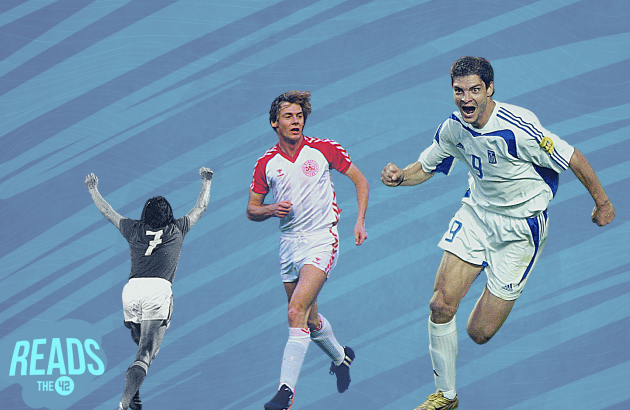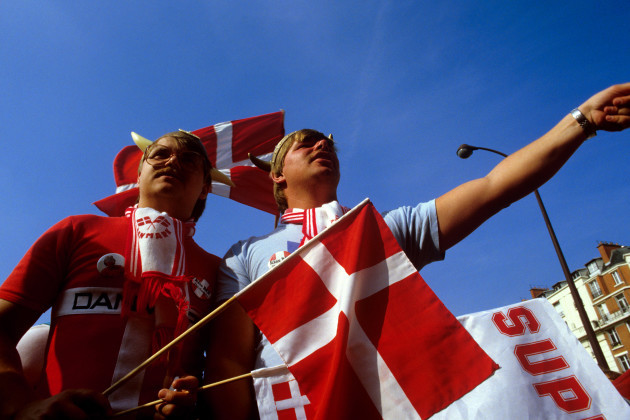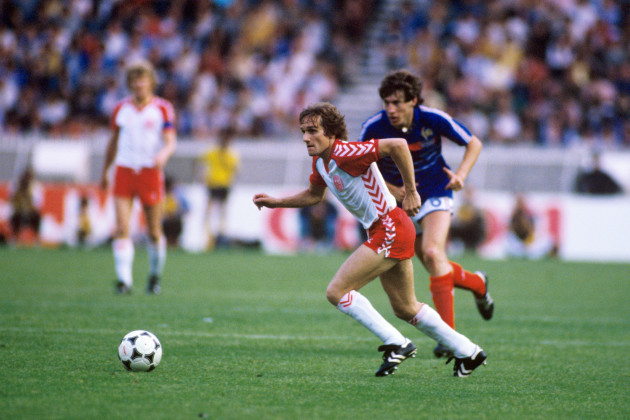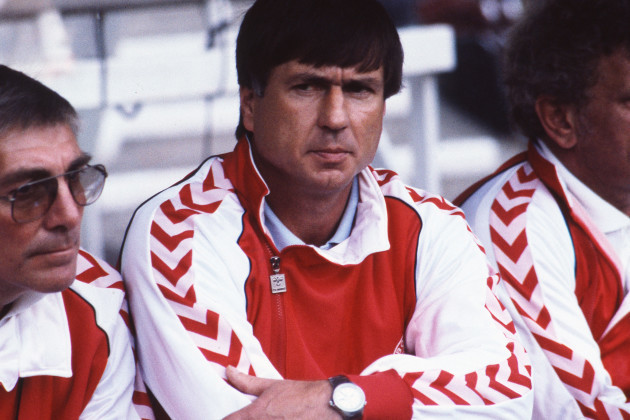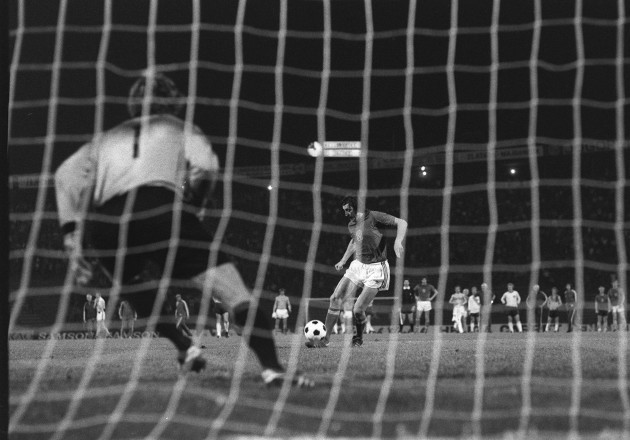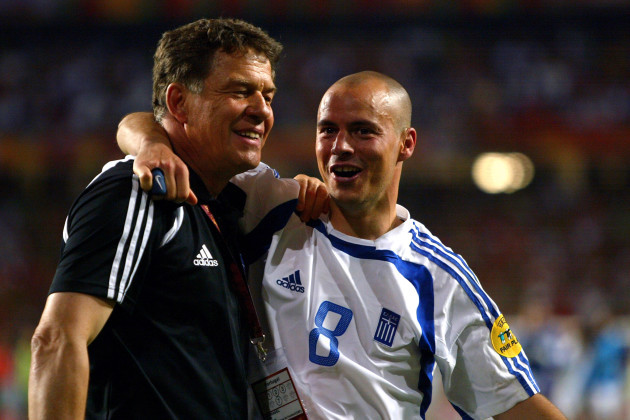Only eight countries have ever won the World Cup – but 10 have triumphed at the Euros, the only major tournament won by the USSR, Czechoslovakia, the Netherlands, Denmark, Greece and Portugal. As a competition, it may not always produce the best champions but it does produce the best stories. Here’s three of them.
Great Danes, cigarettes and alcohol
YOU ALL KNOW about Denmark in 1992. You may even have seen the film, Sommeren 92, on Netflix. At the very least you know the story, how the team who were parachuted into the tournament at the last minute ended up winning it.
You’d imagine then that this is the obvious starting point for a tale about underdogs at the Euros. Instead, it’s little more than a footnote.
To understand why, we need to take you back a bit, starting with a conversation over a few pints in the week of Ireland’s two-legged World Cup play-off against Denmark in 2017. “I won’t be watching the game,” our drinking companion that night in Copenhagen explained. He was a Danish man in his 50s, going by the lines on his face and the sorrow in his eyes. “Football has become too boring.”
And this was before he had even seen Martin O’Neill’s Ireland!
- For more great storytelling and analysis from our award-winning journalists, join the club at The42 Membership today. Click here to find out more >
Our friend had been a roligan, the affectionate nickname bestowed on the 30,000 Danish fans who followed their team at Euro 84, their good-natured behaviour an innocent contrast to the widespread hooliganism of the era. The adventure their team played with in those weeks was even more joyous.
And unexpected. This, after all, was a team that had come from nowhere. You can discount their appearance in the semi-finals of Euro ’64 on the back of Denmark’s outrageously fortunate draw: Malta, Albania and Luxembourg being the teams they’d beaten en route to the last four where a heavy defeat to the USSR delivered a truer reflection of their standing.
Heading into the Euro 84 qualifiers, Denmark were footballing nobodies, winners of just three qualifying games between 1964 and 1980.
And you don’t need to be a genius to figure out why. Only amateurs were allowed play for their national team until 1971; only party-goers were seemingly interested in doing so thereafter, their strict German coach, Sepp Piontek, fighting an endless battle to change their lifestyle as well as their mindset.
This story of their journey from the niteclub to the semi-finals of Euro 84 is superbly told in Rob Smyth and Lars Eriksen’s book, Danish Dynamite, one passage focusing on Piontek’s attempt to impose a 2am curfew before an important qualifier. Fifteen minutes after the deadline had passed, only three of his players had returned, prompting their manager to head down to the niteclub where they were hanging out.
There he’d find the majority of his squad – including the three players who had supposedly checked in before sneaking back out through a fire exit – living it up. One by one, Piontek marched them home, imposing Kr2,500 fines to each of the latecomers.
Some were unperturbed. Preben Elkjaer, the best centre forward in world football from 1984 to 1986, used to pay his fines in advance, handing Pointek Kr5,000 as soon as he arrived into camp. The manager used the money to buy presents for the players whenever they reached a milestone in their career or their life, Elkjaer receiving a pornographic magazine and packet of cigarettes on the day he turned 27.
It’d be a mistake to assume the striker was only capable of throwing shapes on the dancefloor, though. On the pitch he was a devastating, powerful dribbler who had the strength and balance to evade the thuggish defensive tactics of the day, finishing third in the Ballon D’Or voting in 1984, runner-up a year later.
Allan Simonsen had gone one better than that in 1977, the only Dane to win the prize. In 1983, after scoring the winning goal at Wembley to effectively eliminate England and get Denmark to the finals, Simonsen finished third behind Michel Platini.
Then there was Michael Laudrup, later a star on the Barcelona and Real Madrid teams of the ‘90s, regarded then as the best teenager in world football, scorer of six goals in his first five internationals. “He’s a little bit of Franz Beckenbauer, a little bit of Johann Cruyff,” said Piontek.
The rest of the side weren’t too shabby, either, Piontek arranging them into a 3-5-2 formation in order to accommodate the depth of attacking talent at his disposal. Morten Olsen was their sweeper and captain; Soren Busk and Ivan Nielsen the centre back pairing; Jens Jorn Bertelsen and Klaus Berggreen the holding midfielders, providing the team with some semblance of shape.
After that, freedom was granted to the entertainers: Elkjaer, Simonsen, Laudrup, Soren Lerby, Frank Arneson (who’d later appear as Chelsea’s sporting director under Roman Abramovich); Jan Molby then of Ajax later of Liverpool, Jesper Olsen – the winger who’d earn a move to Old Trafford after the Euros.
Together they’d shine in France, overcoming the twin setbacks of Simonsen breaking his leg against France in the tournament opener before the show moved from Paris to Lyon where a fancied Yugoslavia were destroyed 5-0.
Next to Strasbourg, where Belgium – Euro finalists in 1980, conquerors of Argentina in the 1982 World Cup, semi-finalists in Mexico ’86 – took a 2-0 lead. What followed was remarkable, a triumph for adventure and tactical cunning, Piontek replacing a full back, Ole Rasmussen with a striker, Kenneth Brylle, who scored with his first touch. Elkjaer won a penalty and then scored a stunning, individual goal to win it. That night Piontek extended the curfew to 5am; ordering the hotel manager to rearrange breakfast for noon, lunch for 4pm. The German authoritarian had become more Danish than the Danes.
The Roligans, meanwhile, partied with them, camping outside the team hotel, mixing freely with a squad of players who contained a couple of part-timers, including keeper, Ole Qvist, a traffic policeman. That’s partially why 1984 meant more to that generation of Danes than 1992. “It was an easy team to connect with because the football was better; the players just like us,” our friend at the bar told me.
Well, off the field they may have been. On it, they were stars. Spain were lucky to defeat them on penalties in the semi-finals, luckier still in the 1986 World Cup when Denmark threw away a game they had controlled in the first-half to somehow lose 5-1. It was the most bizarre slaughter in the history of World Cups, the only time you can say a team who lost by four goals was the better side.
Still, a marker had been set. Up until 1984, Denmark had only ever qualified for one major tournament. Since then they’ve been to 12. The outsiders have become the establishment; Euro 84 was when the transition happened.
Czech this penno out! It’s the Panenka
When Czechoslovakia were drawn to play the Netherlands in the semi-final of Euro 76, knowing world champions West Germany would be their probable opponents in the final, it was like asking the Titanic to sail through two icebergs on its way to New York.
It may be hard to fathom now but way back then, Dutch and German clubs were dominant in European football, winning seven successive European Cups in the seasons leading up to that year’s finals. On top of that, the Dutch and Germans had contested the 1974 World Cup final, West Germany also claiming the Euros in ‘72.
So what chance had Czechoslovakia? The answer appeared to be none. Reaching the 1962 World Cup final suggested pedigree; failing to qualify for the finals in 1966 and ’74, while falling to three straight defeats in the 1970 finals suggested they’d have been safer staying at home.
Then came ’76. They’d found form, staying unbeaten in 20 games, topping a qualifying group including England and Portugal before seeing off the USSR in a two-legged quarter final. Holland in Zagreb awaited, the semi-final played in such torrential rain that it wasn’t a gameplan Panenka needed but a canoe.
In any case, the Czechs survived, winning 3-1.
Now, when we say the Czechs, we need to be careful. All bar four of that squad was Slovak, although their moustached little playmaker, Antonin Panenka, was a child of Prague, a stalwart of Bohemians Praha, the city’s third club.
Panenka took their free kicks, their corners, their penalties. One night, in a league game against Plzen in 1974, he missed two from the spot, forcing him to obsessively practice his penalties with the club’s goalkeeper, Zdenek Hruska, on a daily basis, the pair adding pressure to the situation by betting on the outcome.
From here, the dinked penalty was born. “Hruska kept defeating me,” Panenka told These Footballing Times, “costing me money. It forced me to come up with new ideas to beat him. One of those was the chipped penalty.”
It worked in training; it then starting working in Czechoslovak league matches which makes you wonder why Sepp Maier, the renowned German goalkeeper, was so shocked by Panenka’s audacious chip. “Well, there wasn’t any internet in 1976,” said Maier years later. “The first time we’d seen Czechoslovakia play was in that year’s semi-final.”
They’d learn a lot. Ivo Viktor was a world class keeper, player of the match in the ’76 final; Jan Pivarnik was their Roy Keane; Zedenek Nehoda their Thierry Henry but it was two different players, Jan Svehlik, and right-back, Karol Dobias, who put them 2-0 in front. Cue a German onslaught, a goal from Gerd Muller, a controversial equaliser from Bernd Holzenbein, a period of extra-time and then the shoot-out.
The first seven penalties were successfully converted before Uli Hoeness hit his effort into the crowd. Panenka had his chance to be a hero and had spent that afternoon discussing his plan with Viktor, his room-mate. “Don’t do the chip,” the goalkeeper advised.
Yet by the time he’d started his run-up, Panenka was watchful of Maier’s actions and as soon the goalkeeper moved left, he decided to gamble. “I knew it was the easiest way for me to score,” he said. “I’d practiced it loads, I knew I could do it. I’d scored 12 penalties like this in matches up until then. I knew what I was at.”
As a result a new name was on the trophy and a new name added to the football lexicon; a Panenka is to penalty takers what the Fosbury Flop is to high-jumpers.
Greek philosophy elevates them to the Gods
It sounds like a story straight out of Greek mythology. A team with no pedigree, whose previous finals appearances had ended without victory, somehow got it right.
No one saw it coming, including the Greek FA, who reacted to the opening two defeats of the 2004 qualification campaign by letting their manager, Otto Rehhagel, know that a third straight loss would cost him his job. The German clearly listened to the threat, his team staying unbeaten for another two years and 15 games.
He did it the hard way, organising a team of ageing journeymen – subtly dubbed ancient Greeks by our friends in The Sun– into a defensive unit who weren’t easy to watch, nor play against. All three of their knockout games in Portugal were won 1-0, set-pieces becoming their speciality and source of Angelos Charisteas’ winning goal in the final.
Needless to say, that 57th-minute header was Greece’s only shot on goal, off their only corner kick.
For Rehhagel, this was the final chapter in an incredible story. A decent player, he became a world class coach, guiding unfashionable Werder Bremen to the Uefa Cup, two German Cups and two Bundesliga titles in the 1980s, winning a third Bundesliga as manager with Kaiserslautern in 1998.
His reward? The sack a couple of years later, which was how he came to end up in Greece, considered yesterday’s man in his own country. ”We want to show youngsters they should play for the national side,” he said after his opening game in charge, a 5-1 defeat to Finland.
“A shameful performance,” declared the SporTime daily. Rehaggel clearly agreed, dropping half his squad after that game. “In order to succeed we need to have team spirit, to convince everyone involved that they must work exclusively for the Greek team,” he said.
They would. A 1-0 win in Spain helped them qualify; a 2-1 victory over Portugal on the opening night of the finals helped them believe. They’d eliminate the Spanish and Russians from their pool to advance to the quarters where victories over France and the Czech Republic sent them to the final.
There Rehaggel’s big-time experience came to the fore again as Georgios Seitaridis, Greece’s best man-marker who had successfully nullified the threat of Thierry Henry and Pavel Nedved in the previous two games, was this time told to police their right-hand side, as Portugal’s chief attacking threats, Cristiano Ronaldo and Luis Figo, tended to alternate wings in an attempt to shake off appointed stalkers.
It was one of many ploys that worked. They kept scoring from corners because they kept varying their deliveries and movements. “The win just proved once again that the Greek soul is, and always will be, our strength,” said Leicester veteran, Theo Zagorakis. “It is the greatest gift that God ever gave us. ”
Always beware Greeks bearing grit.
For more great storytelling and analysis from our award-winning journalists, join the club at The42 Membership today. Click here to find out more >

